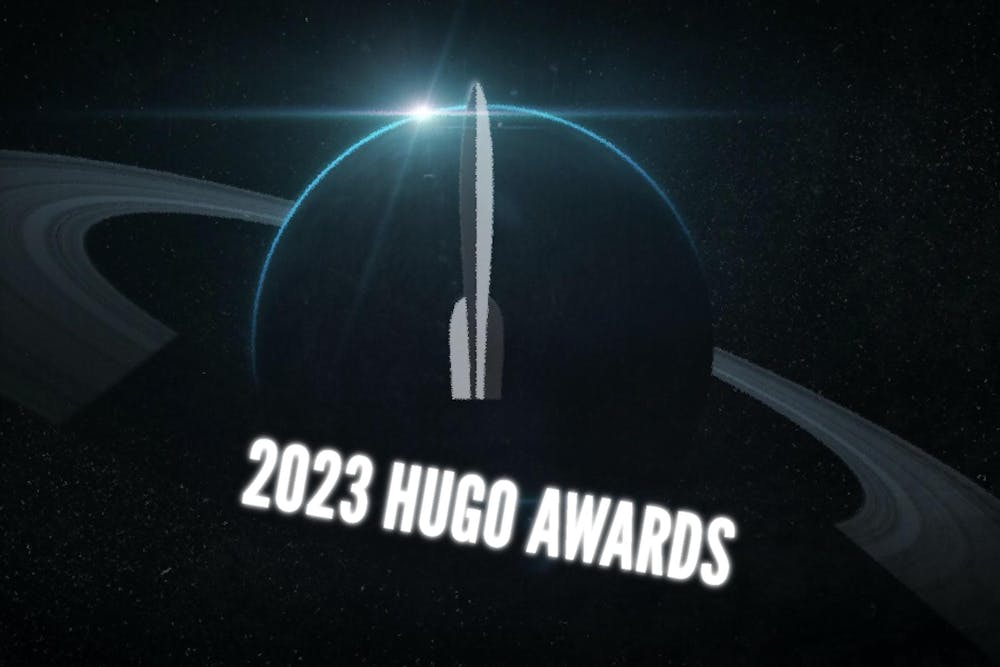The Hugo Award is one of the most prestigious literary awards in the world, recognizing outstanding works of science fiction and fantasy. The awards are presented each year at the World Science Fiction Convention, or “Worldcon,” which in 2023 was held in Chengdu, China.
In January of this year, questions began to swirl about the nomination process for the 2023 awards. Several authors were deemed “not eligible,” including Neil Gaiman, R.F. Kuang and Paul Weimer, even though they had received enough nominations to be considered as finalists for the award.
Why, then, were these authors ineligible? The works that received the nominations were widely praised and considered the best of the year, including season one of the television adaptation of Gaiman’s “The Sandman” and Kuang’s historical speculative fiction novel “Babel.” There was nothing specific in common between the works of any of the ineligible authors. No explanation was given for their disqualification.
A report released on Feb. 15 by Chris M. Barkley, winner of the 2023 Hugo Award for Best Fan Writer, and Jason Sanford, a finalist for the 2023 Hugo Award for Best Fan Writer, revealed the truth behind the disqualifications: self-censorship.
Leaked emails included in the report show members of the Hugo Awards committee compiling dossiers on several would-be finalists, debating themes in the nominated works that could be offensive to the People’s Republic of China and even flagging the authors for criteria unrelated to the awards themselves. Weimer, nominated for the “Best Fan Writer” category, was flagged for “travel[ing] to Tibet” outside of the year of eligibility. He had, in fact, traveled to Nepal.
Novelist Xiran Jay Zhao, another author who received enough nominations for the “Astounding Award” but was considered ineligible, is well-known within the literary community for their TikTok, where they’ve posted several videos discussing the controversy and giving their perspective. In the leaked emails, their presence on TikTok was flagged as part of their potential disqualification. Their four-letter last name was also misspelled twice within the email, and the title of their debut novel “The Iron Widow” was confused with “The Iron Giant,” the 1999 animated science fiction film.
Although the winners of the 2023 Hugo Awards were selected and announced months ago, questions still linger regarding the entire controversy. Why did no one on the committee refuse to compile the dossiers on these authors or otherwise internally protest the censorship? For how long has the Hugo Awards committee allowed ballot manipulation to occur? How “legitimate” are the finalists and winners of the Hugo Awards — not just for 2023, but going back several years, maybe even decades?
That’s not to fault any of the winners themselves, of course. The works that received recognition deserved that recognition. But it’s an awful look for one of the premier awards in the literary world to have such a deep-rooted breach of ethical responsibility.
The actions of the 2023 Hugo Awards committee are blatantly unjust to every disqualified author, but particularly to authors like Kuang and Zhao — English-language writers of Chinese heritage, whose works feature distinctly Chinese narratives and subjects. The “sensitive political themes” that 2023 Hugo Awards administrator Dave McCarty asked to be flagged in the inciting email seemed to specifically target Western Chinese diaspora.
The conclusion is simple. If hosting the awards in any given location would necessitate censorship, the awards should not be hosted in that location. This issue is especially prevalent in literature, where censorship has dominated the conversation for the past several years as U.S. governments and schools continue to institute “book bans.”
The integrity of the world’s most prestigious science fiction and fantasy award has been compromised, and though several members of the 2023 Hugo Awards committee have come forward to apologize, it’s hard to say how exactly this controversy will affect the upcoming 2024 awards hosted in Glasgow.










